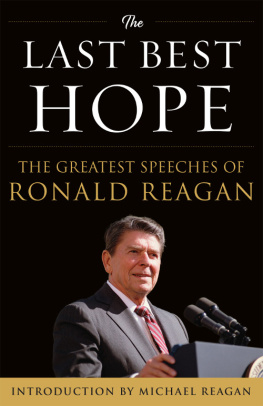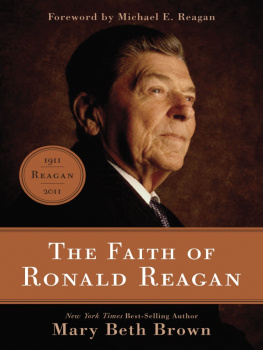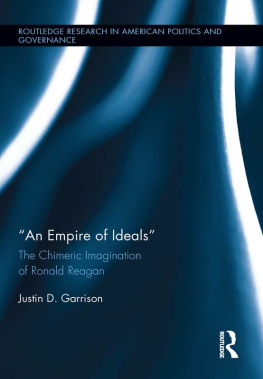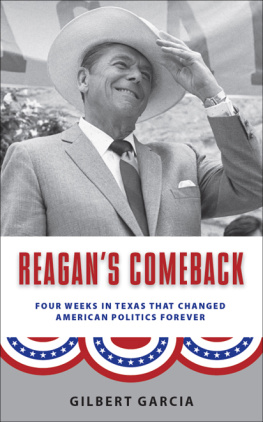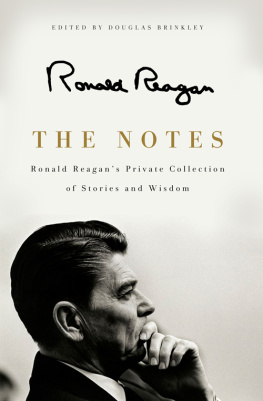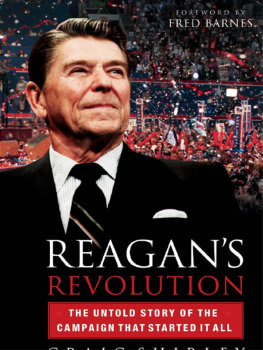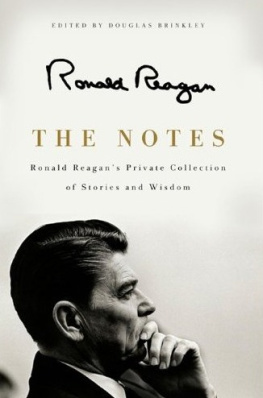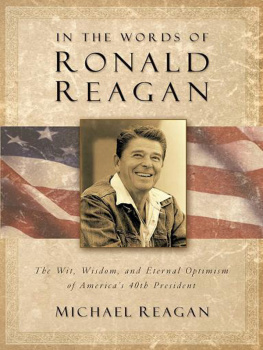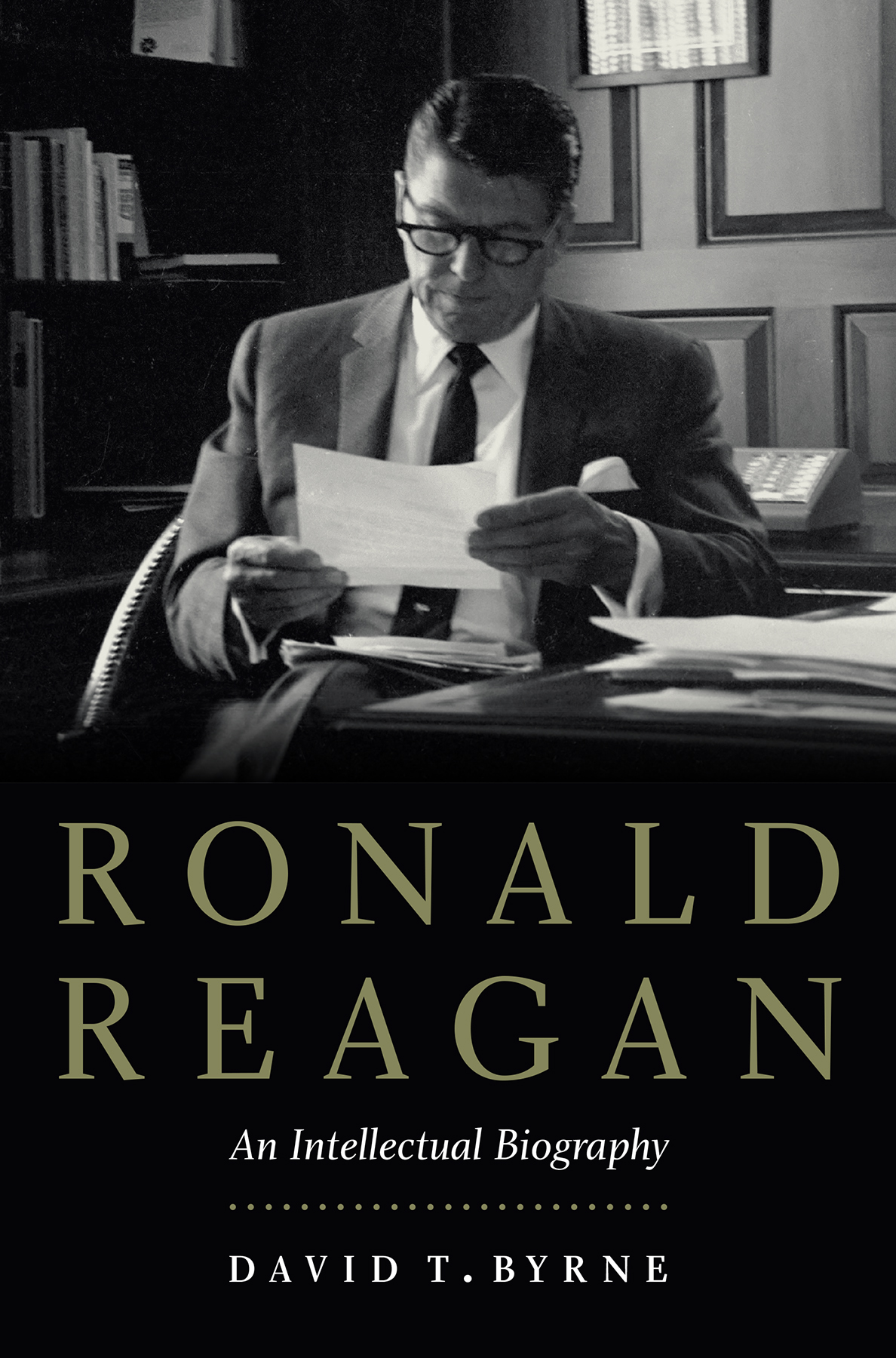
Ronald Reagan: An Intellectual Biography provides unique insight into the mind of one of Americas most enigmatic presidents. This lucid work makes Ronald Reagan more comprehensible. It is an important contribution to Reagan scholarship.
Peter Schweizer, author of Reagans War: The Epic Story of His Forty-Year Struggle and Final Triumph Over Communism
This book is a commendable effort to take Ronald Reagan eminently seriously for his intellect and his intellectual ideas, which indeed formed the basis of Reagans life and his presidency. Byrne accurately deduces the preeminent influence of faith and freedom in the life and mind of Reagan, who called faith and freedom the twin beacons that brighten the American sky. America needed the guidance of both, and Reagan himself was guided by both.
Paul Kengor, PhD, author of God and Ronald Reagan and The Crusader: Ronald Reagan and the Fall of Communism
Ronald Reagan
An Intellectual Biography
David T. Byrne
Potomac Books
An imprint of the University of Nebraska Press
2018 by David T. Byrne
Potomac Books is an imprint of the University of Nebraska Press.
Cover designed by University of Nebraska Press; cover photo the Ronald Reagan Library.
All rights reserved.
Library of Congress Cataloging-in-Publication Data
Names: Byrne, David T., author.
Title: Ronald Reagan: an intellectual biography / David T. Byrne. Description: Lincoln: Potomac Books, 2018. | Includes bibliographical references and index.
Identifiers: LCCN 2018027379
ISBN 9781640120037 (hardback: alk. paper)
ISBN 9781640121263 (epub)
ISBN 9781640121270 (mobi)
ISBN 9781640121287 (pdf)
Subjects: LCSH : Reagan, RonaldPolitical and social views. | Reagan, RonaldPhilosophy. | Reagan, RonaldReligion. | PresidentsUnited StatesBiography. | BISAC : BIOGRAPHY & AUTOBIOGRAPHY / Presidents & Heads of State.
Classification: LCC E 877.2 . B 97 2018 | DDC 973.927092 [B]dc23. LC record available at https://lccn.loc.gov/2018027379.
The publisher does not have any control over and does not assume any responsibility for author or third-party websites or their content.
For my family
My country, tis of Thee,
Sweet Land of Liberty
Of thee I sing;
Land where my fathers died,
Land of the pilgrims pride,
From every mountainside
Let Freedom ring.
Contents
All books are collaborative efforts, and this one is no exception. I would like to thank my agent, Joe Vallely, for finding this work a home, Tom Swanson for believing in this project, and all of the editorial staff at the University of Nebraska Press for their invaluable help.
In his biography of Ronald Reagan, Lou Cannon calls him the Rodney Dangerfield of ideas. Even conservatives, notes Cannon, rarely value Reagan as an idea man. The Conservative Bookshelf, for example, examines the ideas of Pat Buchanan and Whitaker Chambers but excludes Reagan. In his work The Conservative Intellectual Movement in America since 1945, George Nash writes, This book is about conservative intellectualsthose engaged in study, reflection and speculation; purveyors of ideas; scholars and journalists. One can more easily find scholarly intellectual treatments of men like Stalin and Hitler than of Reagan. I want to disprove the notion that Reagan was stupid and elevate him to the rank of an intelligent, thinking person. His ideas need to be studied.
This work was largely inspired by an intellectual biography of President Barack Obama published in 2012. The author of that book describes Obama as very much an intellectual. In terms of ideas, Reagan trumps Obama.
Another task of this work is to explain Reagan to those who have spent so much time studying him. Reagan baffles historians. He was often called an enigma, even by those who knew him best. He authorized one biography as president, and it became one of the most controversial biographies of the twentieth century because in his effort to elucidate Reagan, the author, Edmund Morris, introduced fictional characters. Morris called Reagan one of the strangest men who has ever lived. Even most of Reagans close friends and family acknowledge they never really knew the man who would became the fortieth president of the United States. Biographers have attempted to shine a light on Reagan, but with only limited success, maybe because they have employed conventional methods in order to try to understand an unconventional man. Former president Gerald Ford remarked that Reagan was one of the few leaders he had ever met whose speeches revealed more about him than did private conversations. Consistent with this, I am less interested in Reagans personality, even less so in Reagan the president, and more so in his mind, or his cosmology. A traditional biography examines (usually chronologically) the personal and emotional life of a subject, and an intellectual biography may incorporate some of these methods, but this work analyzes Reagans ideas by establishing a rationale for them. I place them in their historical and cultural context. In doing so I do not try to supplant other Reagan biographies but rather augment them by allowing readers to view Reagan through a different paradigm, one practiced by intellectual historians. An example of this is the fact that this work, unlike almost every other Reagan biography, excludes the most important person in Reagans life, his wife Nancy. This is done because she did little to contribute to his political philosophy.
One other intellectual historian, John Patrick Diggins, attempted to study Reagan, but I found his work wanting. Despite its title, Fate, Freedom and History provides little analysis of how Reagan developed an ideology of freedom. Diggins contends that Reagans core beliefs have their origins in the nineteenth century, particularly in Ralph Waldo Emerson and his idealism. He deems Reagan an Emersonian president. I agree with this, but I think Digginss outlook is a bit provincial, since he reduces Reagans intellectual sources to nineteenth-century America. I think we need to broaden our outlook and ask, What forces created nineteenth-century America? How was the American cultural landscape, and subsequently Reagan, shaped in the first place? Like all Americans, Reagan must be placed within the broader Western tradition. This requires us to venture outside of America history.
When asked why I study European history instead of American history, I answer that it is because America descended from Europe, just as a child descends from a parent. In order to understand American cultural history, one must understand its European roots. The Puritans provide an example. Most educated Americans recognize the Puritanical influence on American societysuch as the Blue Laws that exist in parts of the United States todaybut one must study European history to fully understand the Puritans. Similarly, in order to understand the American cultural values that shaped Reagan, one must study some European history.
Diggins, for instance, is right when he calls Reagan Emersonian, but where did Emerson get his ideas from? The answer is Plato. Plato was the first transcendentalist, arguing that the spiritual world transcends this earthly world. Reagan, like Plato, downplayed material things, instead favoring the spiritual. Plato was both an Idealist and an idealist, the former because he stressed the primacy of the mind and ideas, the latter because he believed in an ideal, utopian system of government. Both can be said of Reagan too. He lived in the world of ideas more than any other twentieth-century president. And Reagan, like Plato, advocated an ideal system of government, which he, like Plato, believed was universal. The casual reader may be surprised to learn that an ancient philosopher such as Plato could shape the thought of those who live 2,500 years after him and who probably have read very little of him! But ideas traverse eras and civilizations. Platos ideas were transmitted to Reagan through Christianity. Platos philosophy contributed to the Christian dualist philosophy, which shaped Reagan by minimizing the significance of the material world in favor of an extrasensory world.
Next page


